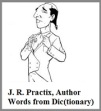Copy-edit: (v) to edit for publication
Although classically it is portrayed that writers suffer “blockage” and are unable to come up with ideas—or even the next line—the truth is, when a writer is inspired with a good story, the characters often become so verbose, and dare I say overbearing, that the end result is an overabundance of syllables, paragraphs and even chapters.
There is actually only one rule in writing, and since there’s only one, we shall not call it a rule, but rather, refer to it as a smiling opportunity.
That would be: “Don’t do anything to interrupt or impede your own story.”
This is why it’s important to copy-edit a book, a story or even an article (such as the one I’m writing to you).
It is not fair to the reader, to get him or her all tied up in useless information about the entwined colors in a particularly plush davenport—when what is happening on the couch is the real gig.
Some writers become fussy and sentimental about one particular thought or character’s involvement. But as you age and mature, you realize that the reader is what you’re writing for—not the approval of other writers or publishers who would jump up and down in great glee if they got the chance to reject a submission from Ernest Hemingway.

Subscribe to Jonathan’s Weekly Podcast
Good News and Better News
